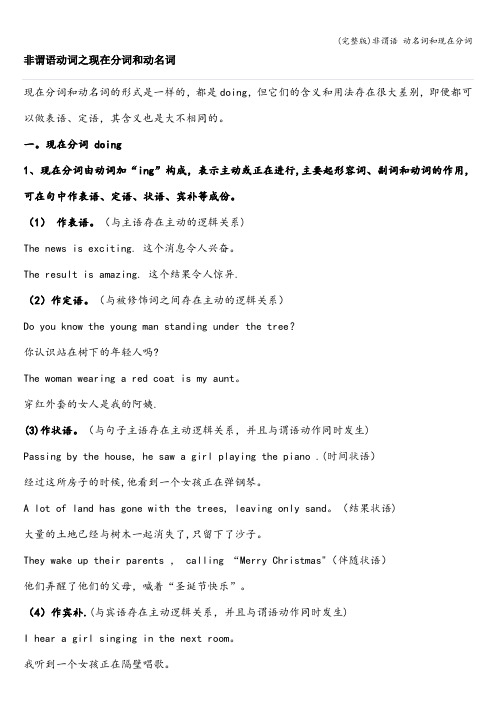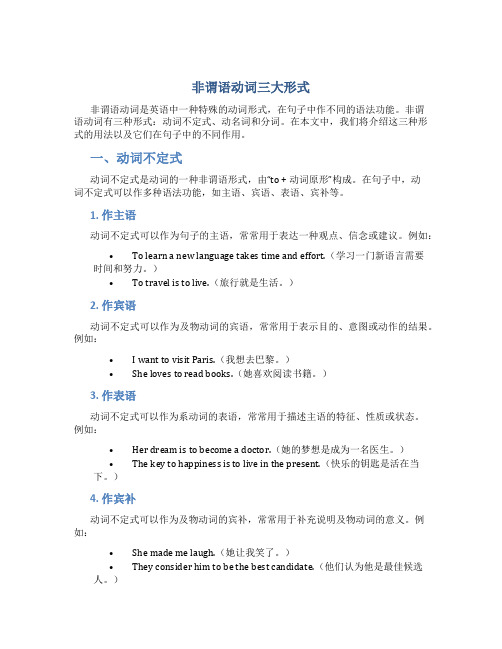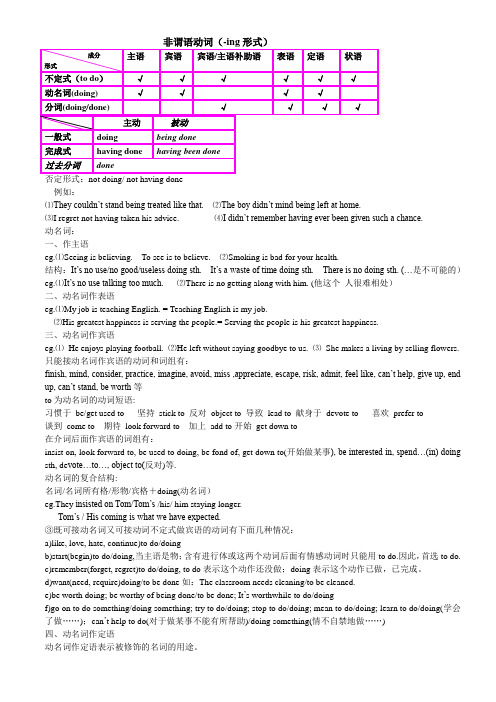动词-ing 形式 非谓语动词,动名词,现在分词
(完整版)非谓语 动名词和现在分词

非谓语动词之现在分词和动名词现在分词和动名词的形式是一样的,都是doing,但它们的含义和用法存在很大差别,即便都可以做表语、定语,其含义也是大不相同的。
一。
现在分词 doing1、现在分词由动词加“ing”构成,表示主动或正在进行,主要起形容词、副词和动词的作用,可在句中作表语、定语、状语、宾补等成份。
(1)作表语。
(与主语存在主动的逻辑关系)The news is exciting. 这个消息令人兴奋。
The result is amazing. 这个结果令人惊异.(2)作定语。
(与被修饰词之间存在主动的逻辑关系)Do you know the young man standing under the tree?你认识站在树下的年轻人吗?The woman wearing a red coat is my aunt。
穿红外套的女人是我的阿姨.(3)作状语。
(与句子主语存在主动逻辑关系,并且与谓语动作同时发生)Passing by the house, he saw a girl playing the piano .(时间状语)经过这所房子的时候,他看到一个女孩正在弹钢琴。
A lot of land has gone with the trees, leaving only sand。
(结果状语)大量的土地已经与树木一起消失了,只留下了沙子。
They wake up their parents ,calling “Merry Christmas"(伴随状语)他们弄醒了他们的父母,喊着“圣诞节快乐”。
(4)作宾补.(与宾语存在主动逻辑关系,并且与谓语动作同时发生)I hear a girl singing in the next room。
我听到一个女孩正在隔壁唱歌。
2、现在分词的否定式:not doingNot knowing where he is, she is feeling anxious。
非谓语动词三大形式

非谓语动词三大形式非谓语动词是英语中一种特殊的动词形式,在句子中作不同的语法功能。
非谓语动词有三种形式:动词不定式、动名词和分词。
在本文中,我们将介绍这三种形式的用法以及它们在句子中的不同作用。
一、动词不定式动词不定式是动词的一种非谓语形式,由“to + 动词原形”构成。
在句子中,动词不定式可以作多种语法功能,如主语、宾语、表语、宾补等。
1. 作主语动词不定式可以作为句子的主语,常常用于表达一种观点、信念或建议。
例如:•To learn a new language takes time and effort.(学习一门新语言需要时间和努力。
)•To travel is to live.(旅行就是生活。
)2. 作宾语动词不定式可以作为及物动词的宾语,常常用于表示目的、意图或动作的结果。
例如:•I want to visit Paris.(我想去巴黎。
)•She loves to read books.(她喜欢阅读书籍。
)3. 作表语动词不定式可以作为系动词的表语,常常用于描述主语的特征、性质或状态。
例如:•Her dream is to become a doctor.(她的梦想是成为一名医生。
)•The key to happiness is to live in the present.(快乐的钥匙是活在当下。
)4. 作宾补动词不定式可以作为及物动词的宾补,常常用于补充说明及物动词的意义。
例如:•She made me laugh.(她让我笑了。
)•They consider him to be the best candidate.(他们认为他是最佳候选人。
)二、动名词动名词是动词的一种非谓语形式,以-ing结尾。
在句子中,动名词可以作多种语法功能,如主语、宾语、表语、宾补等。
1. 作主语动名词可以作为句子的主语,常常用于表示一种习惯、经验或普遍情况。
例如:•Running helps to keep me fit.(跑步有助于保持健康。
初二英语非谓语动词知识点

初二英语非谓语动词知识点非谓语动词是英语中的一个重要语法现象,它由动词的原形或动词的ing形式构成,常常在句子中起到名词、形容词或副词的功能。
非谓语动词包括不定式、动名词和现在分词,它们具有自己的语法特点和用法。
下面将介绍初二英语中非谓语动词的常见知识点。
一、不定式(Infinitive)不定式是由动词的原形加上to构成,它可以作为名词、形容词或副词使用。
1. 作为名词:不定式作为名词时,常用于句子的主语、表语、宾语以及介词的宾语等。
例句:- To learn a foreign language is beneficial for personal development.学习一门外语有助于个人发展。
- My dream is to become a successful writer.我的梦想是成为一名成功的作家。
- He asked me to help him with the assignment.他要求我帮他完成作业。
2. 作为形容词:不定式作为形容词时,可以修饰名词或代词,表示目的、原因、结果等。
例句:- I need a book to read during my vacation.我需要一本可以在假期阅读的书。
- This is a difficult problem to solve.这是个难以解决的问题。
- She was too excited to sleep.她太兴奋无法入睡。
3. 作为副词:不定式作为副词时,可以修饰动词、形容词或副词,表示目的、结果等。
例句:- He studies hard to get good grades.他努力学习以取得好成绩。
- She spoke loudly to make herself heard.她大声说话以让自己被听到。
- We drove carefully not to cause any accidents.我们小心驾驶,以免造成事故。
非谓语(-ing形式)

否定形式:not doing/ not having done例如:⑴They couldn’t stand being treated like that.⑵The boy didn’t mind being left at home.⑶I regret not having taken his advice. ⑷I didn’t remember having ever been given such a chance.动名词:一、作主语eg.⑴Seeing is believing. To see is to believe. ⑵Smoking is bad for your health.结构:It’s no use/no good/useless doing sth.It’s a waste of time doing sth.There is no doing sth. (…是不可能的)eg.⑴It’s no use talking too much.⑵There is no getting along with him. (他这个人很难相处)二、动名词作表语eg.⑴My job is teaching English. = Teaching English is my job.⑵His greatest happiness is serving the people.= Serving the people is his greatest happiness.三、动名词作宾语eg.⑴He enjoys playing football. ⑵He left without saying goodbye to us. ⑶She makes a living by selling flowers. 只能接动名词作宾语的动词和词组有:finish, mind, consider, practice, imagine, avoid, miss ,appreciate, escape, risk, admit, feel like, can’t help, give up, end up, can’t stand, be worth等to为动名词的动词短语:习惯于be/get used to 坚持stick to 反对object to 导致lead to 献身于devote to 喜欢prefer to谈到come to 期待look forward to 加上add to开始get down to在介词后面作宾语的词组有:insist on, look forward to, be used to doing, be fond of, get down to(开始做某事), be interested in, spend…(in) doing sth, de vote…to…, object to(反对)等.动名词的复合结构:名词/名词所有格/形物/宾格+doing(动名词)eg.They insisted on Tom/Tom’s /his/ him staying longer.Tom’s / His coming is what we have expected.③既可接动名词又可接动词不定式做宾语的动词有下面几种情况:a)like, love, hate, continue)to do/doingb)start(begin)to do/doing,当主语是物;含有进行体或这两个动词后面有情感动词时只能用to do.因此,首选to do.c)remember(forget, regret)to do/doing, to do表示这个动作还没做;doing表示这个动作已做,已完成。
动词ing做主语和宾语(带句子成分讲解版)

英语句子有长在短,有简有繁,从现象看, 似乎千变万化,难以捉摸,但从实质看,可 以发现其内在联系,找出其共同规律。英语 句子的基本结构可以归纳成五种基本句型及 其扩大、组合、省略或倒装。掌握这五种基 本句型,是掌握各种英语句子结构的基础。
英语五种基本 句型列式如下 :
S V (主+谓) S V P (主+谓+表) S V O (主+谓+宾) S V o O (主+谓+间宾+直宾) S V O C (主+谓+宾+宾补)
4. 我们发现大礼堂坐满了学生和教师,在听一个重要报告。
We found the great hall full of students and teachers listening to an important report made by a comrade from the People's Daily on current affairs in East Europe.
bus.
但常用的英语句子并不都象基本句型这样简短,这 些句子除了基本句型的成分不变外,通常是在这些 成分的前面或后面增加一些修饰语(modifier)而 加以扩大。这些修饰语可以是单词(主要是形容词、 副词和数词),也可以是
各种类型的短语(主要是介词短语、不定式短语和 分词短语)。
1. 下面以基本句型五为例:
5
Who │cares?
6
What he said │ does not matter.
7
They │ talked for half an hour.
8
The pen │writes smoothly
基本句型 二
此句型的句子有一个共同的特点:句子谓 语动词都不能表达一个完整的意思,必须 加上一个表明主语身份或状态的表语构成 复合谓语,才能表达完整的意思。
非谓语动词讲解以及例句

非谓语动词讲解以及例句非谓语动词是指动词的非谓语形式,不受主语的人称和数的限制,常用作句子的宾语、定语或状语。
非谓语动词包括动名词、不定式和分词三种形式。
一、动名词(-ing形式):1. 作主语:Being kind to others is always a good thing to do.(对他人友善总是值得做的好事。
)2. 作宾语:I enjoy swimming in the ocean.(我喜欢在海里游泳。
)3. 作宾补:She made a decision, ending their relationship.(她做出了一个决定,结束了他们的关系。
)4. 作定语:The running water is so clear and refreshing.(流动的水非常清澈和令人神清气爽。
)5. 作状语:Knowing the answer, he raised his hand.(知道答案后,他举手了。
)二、不定式(to + 动词原形):1. 作主语:To learn a new language is challenging but rewarding.(学习一门新语言是具有挑战性但值得的。
)2. 作宾语:She wants to visit Paris next year.(她想明年去巴黎旅游。
)3. 作宾补:I need to finish this report by tomorrow.(我需要明天之前完成这份报告。
)4. 作定语:He is the best person to ask for help.(他是寻求帮助的最佳人选。
)5. 作状语:She went to the library to study.(她去图书馆学习。
)三、分词:1. 现在分词(-ing形式):The crying baby woke up the entire neighborhood.(哭闹的婴儿吵醒了整个社区。
非谓语动词-现在分词的讲解
非谓语动词非谓语动词包括不定式(to do)、动名词(-ing)、现在分词(-ing)与过去分词(-ed)。
它们不受主语人称和数的限制,在句子中不能充当谓语,但可以充当句子的其他成分,并且有时态和语态的变化。
动词-ing形式的要点1.-ing的形式2.-ing形式的基本用法…(1)作主语:Seeing is believing. 眼见为实。
(2)作表语:Her job is washing and cooking.(3)作宾语:①作及物动词的宾语。
She likes drawing very much.②作某些短语动词的宾语。
Mary is thinking of going back to New York.③ do+限定词(my, some, any, the等)+v.-ing,表示“做…事”之如do some cleaning打扫卫生do some shopping购物④作介词的宾语:Her sister is good at learning physics.⑤作形容词worth, busy等的宾语:This book is well worth reading.只接动词-ing形式而不接不定式作宾语的动词有:【admit 承认appreciate 感激avoid 避免put off 推迟keep 保持consider 考虑delay/ postpone 耽搁dislike 嫌恶resist 抵制mention 提及enjoy 喜欢escape 避免excuse 原谅practice 练习mind介意fancy想不到feel like 意欲finish 完成risk 冒险include 包括forgive 原谅give up 放弃suggest 建议miss 逃过imagine 想象can’t help 情不自禁involve 需要can’t stand无法忍受understand 理解常见的带介词to的短语:be used to 习惯be related to 与……有关get down to 着手做contribute to 贡献put one’s mind to全神贯注于give rise to 引起be equal to 胜任devote oneself to 献身于lead to 导致be opposed to 反对look forward to 盼望object to 反对stick to 坚持pay attention to 注意(4)作定语:The sleeping child is only five years old.(5)作宾语补足语:We can see steam rising from the wet clothes.可以带有这种复合宾语的动词有see, watch, hear, observe, feel, find, have, keep等。
语法复习――非谓语动词(一)动词-ing的用法讲解
语法复习——非谓语动词(一)动词-ing的用法非谓语动词主要包括动词-ing形式、过去分词和不定式。
为了区分这三种不同的非谓语动词的用法和含义,我们将分别从三种非谓语动词在句子中所作的成分以及一些特殊句型等角度来区分其用法和细微含义。
本讲主要阐述动词-ing形式的用法。
动词-ing形式起到名词、形容词和副词的作用,在句中可作主语、宾语和表语、状语和宾语补足语,但不能单独构成谓语。
“动词原形+ing”构成动词-ing形式可分为动名词和现在分词。
一、动名词动名词是v.–ing形式的一种,它具有名词特征,可在句子中作主语、宾语、表语。
1.动名词作主语的几种句型动名词直接置于句首作主语,动名词作主语可以是主动形式,也可以是被动形式。
例如: Swimming in winter is healthy. 冬泳是有益健康的运动。
Picking apples is much better than having classes. 摘苹果比上课好多了。
Being elected chairman is a great honor to him. 被选为主席对他是一个很大的荣誉。
有时主语太长,可用it作形式主语,将真正主语即动名词放在后面。
不是所有的动名词作主语都可用it作形式主语,常见的有: It is + no use+动名词做……没有用处 It is + no good +动名词做……没有好处 It is +nice+动名词做……很好/很不错 It is +useless +动名词做……没有用 It is +interesting+动名词做……很有趣 It is +dangerous+动名词做……很危险 It is+a waste of+动名词做……是浪费…… 例如:It is no use waiting here. Let’s walk home. 在这儿等着没有用,我们走回家吧。
It’s interesting watching the children play. 看着这些孩子们玩耍很有趣。
英语动名词和现在分词的构成
英语动名词和现在分词的构成
动名词(Gerund)和现在分词(Present Participle)在英语中都属于非谓语动词形式。
它们的构成方式如下:
1. 动名词:动名词的构成方式是在动词原形后面加上"-ing"。
例如,run(跑)变为running (跑步)、swim(游泳)变为swimming(游泳)。
2. 现在分词:现在分词的构成方式也是在动词原形后面加上"-ing"。
例如,walk(走路)变为walking(正在走路)、talk(交谈)变为talking(正在交谈)。
需要注意的是,虽然两者的构成方式相同,但它们的用法和含义有所不同。
动名词作为名词使用,通常表示一种行为或活动;而现在分词则通常作为形容词、副词或主动语态的一部分使用,修饰或补充主语或其他名词或代词。
例如:
- Swimming is my favorite sport.(游泳是我最喜欢的运动。
)动名词作为主语。
- The talking dog amazed the audience.(会说话的狗让观众大吃一惊。
)现在分词作为形容词,修饰dog。
- She is walking to school.(她正在走路去学校。
)现在分词作为副词,修饰is walking。
总之,动名词和现在分词的构成方式相同,但用法和含义有所不同。
需要根据具体语境和语法要求进行正确的使用。
非谓语动词之动词的-ing形式
词法:非谓语动词之动词的-ing形式动词的-ing形式包括现在分词和动名词。
具有名词、代词、形容词、副词的特征,同时还具有动词的某些特征,在句中可作主语、表语、宾语、宾补、主补、定语和状语。
1.动词的-ing形式的时态与语态动词的-ing形式保留着动词的若干特征,又具有形容词、副词的特征,有时态和语态变化。
其时态和语态的形式如下所示:①主动语态的一般式:doing被动语态的一般式:being done其否定形式是在doing之前加上not②主动语态的完成式:having done被动语态的完成式:having been done其否定形式是在doing之前加上not(1)一般式①表示泛指时间-ing形式的一般式表示的动作通常是一般性动作,即不是明确地发生在过去、现在或将来的动作。
I hate talking with such boastful people .Being careless is not a good habit , whatever you do .②表示与谓语同时发生的动作-ing形式的一般式可表示和谓语动词同时发生的动作。
The children surrouded the teacher , listening attentively to her story .Following the guide , we were walking into the deep virgin forest .③表示发生在谓语动词之前的动作对于某些动词,我们常用-ing形式的一般式表示完成,尽管动作发生在谓语动词动作之前,这似乎已经成为一种习惯。
Excuse me for being late .I don't remember ever meeting you somewhere .Thank you for giving us so much help last time we were in Queens(纽约皇后区).④表示发生在谓语动词之后的动作Most doctors strongly insist on giving up smoking and taking plenty of exercises .(2)完成式-ing形式的完成式表示的动作发生在谓语动词之前。
- 1、下载文档前请自行甄别文档内容的完整性,平台不提供额外的编辑、内容补充、找答案等附加服务。
- 2、"仅部分预览"的文档,不可在线预览部分如存在完整性等问题,可反馈申请退款(可完整预览的文档不适用该条件!)。
- 3、如文档侵犯您的权益,请联系客服反馈,我们会尽快为您处理(人工客服工作时间:9:00-18:30)。
动词-ing 形式动词-ing形式由动词加-ing变化而成, 它同时具有名词和动词的特征, 在句中可以作主语、宾语、定语、宾语补足语及状语。
动词-ing形式不能单独作谓语,有时态和语态的变化。
主动形式被动形式一般式doing being done完成式having done having been done 否定形式: not+ -ing 构成一、动词-ing形式作主语1. 表示经常的、习惯性的动作或状态, 谓语动词通常用单数。
如:Walking is a good form of exercise for both young and old. 无论对年轻人和老年人来讲, 走路是一种很好的锻炼。
Watching news on TV has become a routine for me. 在电视上看新闻已经成了我的一种日常习惯。
Asking a woman’s age is impolite in some countries.在一些国家问一个女人的年龄是不礼貌的。
2. -ing形式作主语时常后置, 此时须用it作形式主语。
如:It is no use / no good / fun / hard work / a hard (difficult) job / a waste of time / dangerous / worthwhile / useless + doing。
如:It’s no use making an excuse for this.为这件事找借口是没有用的。
It is no good waiting for other people to make decisions for you. 等别人替你做决定是没有用的。
It’s a waste of time talking about such a useless thing. 谈论这样无用的事情简直是浪费时间。
二、动词-ing用作宾语1. 只能后接动名词作宾语的动词, 常见的有:finish, enjoy, avoid, admit, keep, mind, imagine, risk, practice, appreciate, consider, escape, miss, suggest, can’t stand, can’t help, give up, feel like, put off, permit等。
2. 既可接动名词又可接不定式作宾语的动词, 意义差别不大的动词,常见的有: like, love, hate, prefer, begin, start, continue等。
3. 既可接动名词又可接不定式作宾语的动词, 但意义完全不一样的,常见的有:forget, remember, mean, regret, stop, try等。
4. 动词-ing形式作介词的宾语。
devote to, look forward to, stick to, be used to, object to(反对), pay attention to, get down to, lead to, be crazy about, be tired of, succeed in, have difficulty in等。
三、-ing形式作定语1. 单个动词的-ing形式作定语位于被修饰名词的前面, 既可以表示被修饰者的作用或功能, 也可以表示被修饰者的动作或状态。
如:printing factory = a factory for printing; the shopping center = the center for shopping;tiring music = music that is tiring; a surprising result = a result that is surprising2. –ing 形式短语作定语时, 放在所修饰的名词之后, 并且在意思上相当于一个定语从句。
如:They lived in a room facing the street. = They lived in a room that faces the street. 他们住在一间面朝街的房子。
The man standing there is Peter’s father. = The man who is standing there is Peter’s father. 站在那儿的那个人是彼得的父亲。
Anybody swimming in this river will be fined. = Anybody who is swimming in this river will be fined. 在这条河里游泳的任何一个人都会被罚款。
The building being built now is our new library. 现在正在建造的这栋楼房室我们的新图书馆。
3. -ing形式短语也可以用作非限制定语, 相当于一个非限制性定语从句, 这时, 它与句子其他部分用逗号分开。
如:His brother, working as a teacher, lives in Beijing. = His brother, who is working as a teacher, lives in Beijing. 他那个当教师的哥哥住在北京。
四、-ing形式作宾语补足语1. 动词-ing形式作宾语补足语常放在宾语后面, 表示一个正在进行的主动性的动作, 强调一个过程或一种状态。
如:When we returned to the school, we found a stranger standing at the entrance. 当我们回到学校时, 发现一个陌生人站在大门口。
2. 能用-ing 形式作宾语补足语的几类动词:1)、表示感觉和心理状态的动词:see, watch, smell, feel, hear, find, notice, observe, catch, look at, listen to等。
2)、表示指使意义的动词:have, leave, set, keep, get 等。
五、-ing形式作状语-ing作状语时, 其逻辑主语必须是句子的主语。
现在分词在句中作状语,表示动作发生的原因、时间、方式、结果、条件、伴随状况等。
1.–ing 形式作时间状语Hearing the news, they all jumped with joy.While walking along the road, Cruse caught sight of a poor dog.Having finished the work, they went out for a walk. 2.–ing 形式作原因状语Being ill, she didn’t go to school yesterday.Having finished my work ahead of time, I was allowed to go home.Not knowing hi s phone number, we couldn’t get in touch with him.3.–ing 形式作结果状语The fire lasted nearly a month, leaving nothing valuable.The snow lasted a week, resulting in a serious traffic confusion in the whole area.4.–ing 形式作条件状语Listening to English every day, you’ll learn it well step by step.Taking the path that leads out of the town, you will come to a wood.5.–ing 形式作伴随状语I stood by the door, not daring to say a word.He was walking along the street, looking this way and that.6.–ing 形式作让步状语Working or reading, she always did her best.= Whether she worked or read, …Not being a rich man himself, he helped the poor generously.= Although he was not a rich man, …1. On ____( return ) home, he found his mother seriously ill.2. He suggested _______( have ) a basketball game next week.3. Don’t waste time ______ ( mourn).4. Who needs ______( look ) after?5. There is no need _______( say ) again.6. He advised _______( read ) the novel again.7. No ________( spit ).8. He felt sorry for ____( not having helped, having not helped) her.9. We regretted ____( being unable to come, being not able to come ).10. I remember ___ (not taking, taking no, taking not ) key out.11. He came to the party without ____ (ask) me.12. He came to the party without ____ (ask).13. Has she suggested _____( having done, doing) it again?14. I am sorry I couldn’t help them though I said I would .I apologize for ___( having not kept, not keeping ) my promise.15. They don’t like _____( Lin Pin, Lin Pin’s, his, him, he ) coming to help.16. ___(Mary, Mary’s, her ) coming here made us much delighted17. He has devoted himself to ____( study ) the problem of old age.18. Have you got used to _____ ( live ) in the country?19. They came ______(fall ) in love with each other.20. We get ____ ( realize ) that he is an honest man.21. I hate ____( say ) it, but I don’t like you plan.22. I hate ____( cheat ) in the exam and ____ ( lie ) in our day life.23. ___( Repairing , The repairing ) cars is expensive.24. ___ ( Repairing , The repairing ) of my car is expensive.25. We need some salt. Can you help do _(the, / ) shopping?26. She should give the room ___( a, / ) good cleaning.27. Every day we do ___( some, / ) reading in our classroom.1.The first textbooks ______ for teaching English as a foreign language came out in the 16th century.A. to be writtenB. writtenC. being writtenD. having written2.The children insisted ______ there on foot.A. they goingB. they would goC. on their goingD. going3.He still remembers ____ to Shanghai when he was very young.A. takingB. being takenC. takenD. having taken4.With the boy ______ the way, we had no trouble ______ the way ______ to Zhongshan Park.A. leading; finding; leadingB. to lead; found; to leadC. led; finding; ledD. leading; found; led5.I can hardly imagine Peter ___ across the AtlanticOcean in five days.A. to have sailedB. to sailC. sailingD. sail6.If you wave your book in front of your face, you can feel the air ______ against your face.A. movedB. movingC. movesD. to move7. While shopping, people sometimes can´t help ______ into buying something they don´t really need.A. persuadeB. persuadingC. being persuadedD. be persuaded8. There was terrible noise ___ the sudden burst of light.A. followedB. followingC. to be followedD. being followed9. Please excuse my ______ in without ______ .A. come; permittedB. coming; permittedC. coming; being permittedD. to come; being permitted10.¬——Did you hear her ______ this pop song this time the other day?——Yes,and I heard this song ___ in English.A. sing; singingB.sung; sungC. sung; singingD.singing; sung11.The question ______ now at the meeting is not the question ______ yesterday.A. discussed; discussedB. discussing;had discussedC.being discussed;discussedD. discussing;discussing12.With the cooking ____ ,I went on ____ some sewing.A.done; to doB.being done;doingC.to be done;doingD.to have done;doing13.It is no use ______ your past mistakes.A.regrettingB.regretC.to regretD.regretted14.I would appreciate ____ back this afternoon.A. you to callB. you callC. your callingD. you’re calling15.Climbing mountains was ____ ,so we all felt ____ .A. tiring; tiredB. tired; tiringC. tiring; tiringD. tired; tired16.There is a river ______ around our school.A. to runB. runC. runningD. to be running17.How about the two of us ______ a walk down the garden?A. to takeB. takeC. takingD. to be taken 18.I was fortunate to pick up a wallet ______ on the ground on the way back home, but unfortunately for me, I found my colour TV set ______ when I got home.A. lying; stolenB. laying; stealingC. lay; stolenD. lying; stealing19.He was always listened ______ in the next room.A. singB. sungC. to singD. singing20.Go on ____ the other exercise after you have finished this one.A. to doB. doingC. withD. to be doing21.The day we looked forward to ______ .A. comeB. comingC. has comeD. have come22.The government forbids ______ such bad books.A. publishedB. to publishC. publishD. publishing23. It took the workmen only two hours to finish ____ my car.A. repairingB. repairC. to repairD. repaired24. It’s no good ____ over split milk.A. to cryB. cryingC. criedD. cry25. Have you forgotten _____$1000 from me last month? Will you please remember ____ it tomorrow?A. borrowing; to bringB. to borrow; bringC. borrowed; bringingD. borrowing; bringing26. The classroom wants _____.A. cleanB. cleanedC. to cleanD. cleaning27. Jack said that he wouldn't mind _____ for us.A. to waitB. waitC. waitingD. waited28. My brother keeps _________ me with my work. A. to help B.help C.helping D.helped29. We should often practise ___ English with each other.A. to speakB. spokeC. speakD. speaking30. Keep on ___ and you will succeed.A. a tryB. tryC. tryingD. trying31. His parents insist on ____ to college.A. he should goB. he goC. his goingD. him to go32. The story was so funny that we _____.A. couldn’t help laughB. can’t but laughC. couldn't help laughingD. couldn’t help but to laugh33. How much time did you spend ____ the text?A. copyingB. to copyC. in copyD. on copying34.Though it sounds a bit too dear(昂贵),it is worth ______.A. being boughtB. buyingC. to buyD. buying it35. The novel is well ____.A. worth to readB. worth being readC. worthy to readD. worthy of being read36. The farmers were busy _____ cotton.A. to pickB. pickingC. with pickingD. pick 37.——I usually go there by train.——Why not _____ by boat for a change?A. try goingB. trying to goC. to try and goD. to try going38. They set out ____ for the ____ boy.A. searching; losingB. searching; lostC. to search; lostD. searched; losing39. The student sat there, ____ what to do.A. doesn’t knowingB. didn’t knowingC. not knowD. not knowing40. He sat there _____ , with his head on his hand.A. and thinkB. thinkingC. thoughtD. being thought41. The ____ Prime Minister expressed his satisfaction with his talks, ___ that he had enjoyed his stay here. A. visiting; add B. visited; addingC. visiting; addingD. visited; added42. I couldn’t do my homework with all that noise ___.A. going onB. goes onC. went onD. to go on43. Yesterday Professor Li received a letter from one of his friends, ___ him to write an article, and he accepted.A. having invitedB. invitedC. to be invitedD. inviting44. Finding her car stolen, _________.A. a policeman was asked to helpB. the area was searched thoroughlyC. it was looked for everywhereD. she hurried to a policeman for help45. ________, the boy couldn’t enter his house.A. Since the key has lostB. The key been lostC. Lost the keyD. Having lost the key46. The secretary worked late into the night, ____ a long speech for the president.A. to prepareB. preparingC. preparedD. was preparing47. European foot ball is played in 80 countries, _____ it the most popular sport in the world.A. makingB. makesC. madeD. to make48. ____ a reply, he decided to write again.A. Not receivingB. Receiving notC. Not having receivedD. Having not received49. ____ his telephone number, she had some difficulty getting in touch with Bill.A. Not knowingB. knowing notC. Not having knownD. Having not known50. ____ the programme, they have to stay there for another two weeks.A. Not completingB. Not completedC. Not having completedD. Having not completed1._______ (scold) a child will do more harm thangood.2._______ (swim) is one of the best all-roundexercises. It keeps me in good shape.3.It is a waste of time ________ (discuss) suchmatters with him.4.He suggested ________ (take) my daughter to thezoo the next Sunday.5.We don’t allow _______ (smok e) in the classroom.6.When you feel cold, try to keep your body ______(move).7.The girl _________ (write) a letter is theprofessor’s daughter.8.Entering the room, I found Mary ______ (sit) atthe desk and playing the computer games.9.Women ________ (look) after small children inthis city usually get paid by the month.10.The teacher ______ (teach) us English is MissZhou.11.I notice a long queue outside the ticket office_____ (wait) for it to open.12.The girl watched his father ______ (shave) his facewith great interest.13.The children _______ (practise) playing the violinover there will give a performance next week. 14.她转过身,看见一辆车朝她开来。
